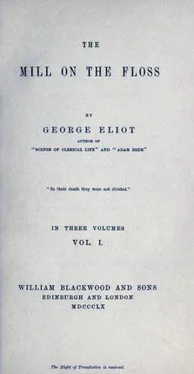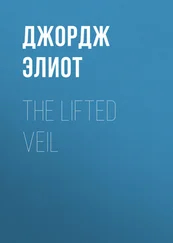"It's nonsense!" she said, "and very ugly stuff; nobody need want to make it out."
"Ah, there, now, Miss Maggie!" said Tom, drawing the book away, and wagging his head at her, "You see you're not so clever as you thought you were."
"Oh," said Maggie, pouting, "I dare say I could make it out, if I'd learned what goes before, as you have."
"But that's what you just couldn't, Miss Wisdom," said Tom. "For it's all the harder when you know what goes before; for then you've got to say what definition 3 is, and what axiom V. is. But get along with you now; I must go on with this. Here's the Latin Grammar. See what you can make of that."
Maggie found the Latin Grammar quite soothing after her mathematical mortification; for she delighted in new words, and quickly found that there was an English Key at the end, which would make her very wise about Latin, at slight expense. She presently made up her mind to skip the rules in the Syntax, the examples became so absorbing. These mysterious sentences, snatched from an unknown context, — like strange horns of beasts, and leaves of unknown plants, brought from some far-off region, — gave boundless scope to her imagination, and were all the more fascinating because they were in a peculiar tongue of their own, which she could learn to interpret. It was really very interesting, the Latin Grammar that Tom had said no girls could learn; and she was proud because she found it interesting. The most fragmentary examples were her favourites. Mors omnibus est communis would have been jejune, only she liked to know the Latin; but the fortunate gentleman whom every one congratulated because he had a son "endowed with such a disposition" afforded her a great deal of pleasant conjecture, and she was quite lost in the "thick grove penetrable by no star," when Tom called out,–
"Now, then, Magsie, give us the Grammar!"
"Oh, Tom, it's such a pretty book!" she said, as she jumped out of the large arm-chair to give it him; "it's much prettier than the Dictionary. I could learn Latin very soon. I don't think it's at all hard."
"Oh, I know what you've been doing," said Tom; "you've been reading the English at the end. Any donkey can do that."
Tom seized the book and opened it with a determined and business-like air, as much as to say that he had a lesson to learn which no donkeys would find themselves equal to. Maggie, rather piqued, turned to the bookcases to amuse herself with puzzling out the titles.
Presently Tom called to her: "Here, Magsie, come and hear if I can say this. Stand at that end of the table, where Mr. Stelling sits when he hears me."
Maggie obeyed, and took the open book.
"Where do you begin, Tom?"
"Oh, I begin at 'Appellativa arborum,' because I say all over again what I've been learning this week."
Tom sailed along pretty well for three lines; and Maggie was beginning to forget her office of prompter in speculating as to what mas could mean, which came twice over, when he stuck fast at Sunt etiam volucrum.
"Don't tell me, Maggie; Sunt etiam volucrum — Sunt etiam volucrum — ut ostrea, cetus—"
"No," said Maggie, opening her mouth and shaking her head.
"Sunt etiam volucrum," said Tom, very slowly, as if the next words might be expected to come sooner when he gave them this strong hint that they were waited for.
"C, e, u," said Maggie, getting impatient.
"Oh, I know — hold your tongue," said Tom. "Ceu passer, hirundo; Ferarum — ferarum—" Tom took his pencil and made several hard dots with it on his book-cover—"ferarum—"
"Oh dear, oh dear, Tom," said Maggie, "what a time you are! Ut—"
"Ut ostrea—"
"No, no," said Maggie, "ut tigris—"
"Oh yes, now I can do," said Tom; "it was tigris, vulpes, I'd forgotten: ut tigris, volupes; et Piscium."
With some further stammering and repetition, Tom got through the next few lines.
"Now, then," he said, "the next is what I've just learned for to-morrow. Give me hold of the book a minute."
After some whispered gabbling, assisted by the beating of his fist on the table, Tom returned the book.
"Mascula nomina in a," he began.
"No, Tom," said Maggie, "that doesn't come next. It's Nomen non creskens genittivo—"
"Creskens genittivo!" exclaimed Tom, with a derisive laugh, for Tom had learned this omitted passage for his yesterday's lesson, and a young gentleman does not require an intimate or extensive acquaintance with Latin before he can feel the pitiable absurdity of a false quantity. "Creskens genittivo! What a little silly you are, Maggie!"
"Well, you needn't laugh, Tom, for you didn't remember it at all. I'm sure it's spelt so; how was I to know?"
"Phee-e-e-h! I told you girls couldn't learn Latin. It's Nomen non crescens genitivo."
"Very well, then," said Maggie, pouting. "I can say that as well as you can. And you don't mind your stops. For you ought to stop twice as long at a semicolon as you do at a comma, and you make the longest stops where there ought to be no stop at all."
"Oh, well, don't chatter. Let me go on."
They were presently fetched to spend the rest of the evening in the drawing-room, and Maggie became so animated with Mr. Stelling, who, she felt sure, admired her cleverness, that Tom was rather amazed and alarmed at her audacity. But she was suddenly subdued by Mr. Stelling's alluding to a little girl of whom he had heard that she once ran away to the gypsies.
"What a very odd little girl that must be!" said Mrs. Stelling, meaning to be playful; but a playfulness that turned on her supposed oddity was not at all to Maggie's taste. She feared that Mr. Stelling, after all, did not think much of her, and went to bed in rather low spirits. Mrs. Stelling, she felt, looked at her as if she thought her hair was very ugly because it hung down straight behind.
Nevertheless it was a very happy fortnight to Maggie, this visit to Tom. She was allowed to be in the study while he had his lessons, and in her various readings got very deep into the examples in the Latin Grammar. The astronomer who hated women generally caused her so much puzzling speculation that she one day asked Mr. Stelling if all astronomers hated women, or whether it was only this particular astronomer. But forestalling his answer, she said,–
"I suppose it's all astronomers; because, you know, they live up in high towers, and if the women came there they might talk and hinder them from looking at the stars."
Mr. Stelling liked her prattle immensely, and they were on the best terms. She told Tom she should like to go to school to Mr. Stelling, as he did, and learn just the same things. She knew she could do Euclid, for she had looked into it again, and she saw what A B C meant; they were the names of the lines.
"I'm sure you couldn't do it, now," said Tom; "and I'll just ask Mr. Stelling if you could."
"I don't mind," said the little conceited minx, "I'll ask him myself."
"Mr. Stelling," she said, that same evening when they were in the drawing-room, "couldn't I do Euclid, and all Tom's lessons, if you were to teach me instead of him?"
"No, you couldn't," said Tom, indignantly. "Girls can't do Euclid; can they, sir?"
"They can pick up a little of everything, I dare say," said Mr. Stelling. "They've a great deal of superficial cleverness; but they couldn't go far into anything. They're quick and shallow."
Tom, delighted with this verdict, telegraphed his triumph by wagging his head at Maggie, behind Mr. Stelling's chair. As for Maggie, she had hardly ever been so mortified. She had been so proud to be called "quick" all her little life, and now it appeared that this quickness was the brand of inferiority. It would have been better to be slow, like Tom.
"Ha, ha! Miss Maggie!" said Tom, when they were alone; "you see it's not such a fine thing to be quick. You'll never go far into anything, you know."
Читать дальше












